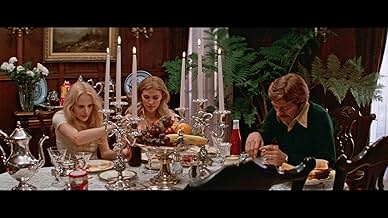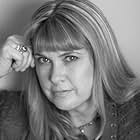IMDb RATING
5.7/10
1.9K
YOUR RATING
An affluent businessman allows a spinster and her young sidekick to take shelter in his home during a storm, where they proceed to seduce then torment him.An affluent businessman allows a spinster and her young sidekick to take shelter in his home during a storm, where they proceed to seduce then torment him.An affluent businessman allows a spinster and her young sidekick to take shelter in his home during a storm, where they proceed to seduce then torment him.
- Director
- Writers
- All cast & crew
- Production, box office & more at IMDbPro
Storyline
Did you know
- TriviaThe film's three stars were each born nine years apart from each other: Seymour Cassel in January 1935, Sondra Locke in May 1944, and Colleen Camp in June 1953.
- GoofsWhen the women are pretending to hold court and Jackson throws down a small statue to smash it, the downward-facing shot clearly reveals that it's already in large separate pieces before it hits the floor.
- Quotes
George Manning: You have the manners of an alley cat.
- Crazy creditsBefore the opening credits: "This motion picture is based on a true story. It should serve to remind us that fate allows no man to insulate himself against the evil which pervades our society."
- ConnectionsFeatured in The Last Drive-In with Joe Bob Briggs: Death Game (2024)
Featured review
It is 1975, and George Manning is a happily married man living in San Francisco. On his 40th birthday, a family emergency necessitates his wife Karen travelling to a different state, leaving George alone but for the wind and the rain. Or so he thinks, for fate brings him guests that night: two young ladies named Jackson and Donna, who say they're lost. After inviting them in to warm up and dry off, George and the ladies get to know each other better; and it becomes clear that they don't plan on leaving his home any time soon- whether he wants them there or not.
Directed by Peter S. Traynor from a screenplay by Anthony Overman and Michael Ronald Ross (as well as an uncredited Jo Heims) 'Death Game' is a camp comic-horror both entertaining and underwhelming. Exploitative and overblown, the film is a product of its time, reflecting the anxieties and fantasies of the post-Vietnam War period. Indeed, if one were to examine the film in the context of that conflict, one could say it shows how the illusion of security and order that many Americans had was shattered, how they became vulnerable and helpless in the face of an unpredictable, hostile enemy, and how they struggled to cope with the aftermath and consequences of a most violent encounter.
While this and other interesting ideas are raised- the warped reality of a male sexual fantasy, for one, or the indifference of fate and the effects of abuse on the psyche- the variety of themes in 'Death Game' are only ever really hinted at and never fully explored. The narrative doesn't break any new ground and features few surprises, unfolding in a linear and generic fashion, populated by scene after scene of mental and physical torture that leaves a grisly aftertaste. The abrupt ending of proceedings is also jarring, feeling rushed and completely out of left field in the face of the lengthy brutality that came before it.
Though tame when compared to modern films such as 'Hostel', which go all out on the gore and violence; 'Death Game' still disturbs and unnerves. The characters of Jackson and Donna are utterly unhinged, unpredictable creations, with no morals or empathy to speak of. Psychopathic and merciless, they are reflections of the fears the middle classes had of many in the hippie movement; of the Mansonesque types who stole into homes and left destruction in their wake. Though similar in ways to 'Straw Dogs' or 'The Last House on the Left' through its depiction of home invasion and violence; 'Death Game' differs with its tone and style, which are more humorous and exaggerated than realistically gritty.
David Worth's artsy cinematography creates an eerie, claustrophobic atmosphere, while he manifests dread and tension through his use of shadows, distorted angles and close-ups. Worth employs an array of creative techniques- such as double and triple exposures, slow motion and freeze frames- to enhance the macabre, nightmarish quality of the film, while his work as editor of the picture gives it a brisk pace and smooth flow. His work on 'Death Game' is one of its main strengths; elevating as it does the material from a simple exploitation flick to a stylish, visually striking psychological horror.
Jimmie Haskell's score also comes as a boon to proceedings in general, providing a fitting musical accompaniment to the film's mood and tone. Haskell composed two original tunes for 'Death Game': 'Good Old Dad', a cheerfully ironic song that plays during the opening credits, contrasting with the horror that follows; as well as 'We're Home', a haunting, melancholic song that plays during the closing credits, reflecting the aftermath of the ordeal. Memorable and stirring, Haskell's score adds to the film's atmosphere, enhancing its scenes of tension, violence and insanity.
Much like its narrative, the performances in 'Death Game' are a bit of a mixed bag. On the one hand, Sondra Locke and Colleen Camp are delightfully over-the-top as Jackson and Donna, delivering convincing, captivating portrayals of people completely enslaved by madness. They share an electric chemistry and keep you on the edge of your seat throughout. On the other hand, Seymour Cassell plays George as an exceedingly apathetic fellow, who lacks charisma and charm, ending up as nothing more than a plot device for the two ladies to play with. Allegedly, Cassell hated working under Traynor and refused to loop George's dialogue once filming wrapped- explaining why, in the final cut, it is David Worth you hear whenever George speaks. At any rate, Locke and Camp's exuberant performances make the film worthwhile; with or without Cassell's voice.
At the end of the day, Peter S. Traynor's 'Death Game' is a rather underwhelming effort, though it does have elements deserving of praise. Stars Sondra Locke and Colleen Camp make for a terrifying twosome, delivering energetic, unhinged performances that are highlights in both their filmographies, while the atmospheric score and David Worth's artistic cinematography are striking and unforgettable. Although the narrative doesn't come to much, contains few surprises and unfolds in a linear way, there are some memorable moments in 'Death Game.' It just might not be something you'd play again in a hurry.
Directed by Peter S. Traynor from a screenplay by Anthony Overman and Michael Ronald Ross (as well as an uncredited Jo Heims) 'Death Game' is a camp comic-horror both entertaining and underwhelming. Exploitative and overblown, the film is a product of its time, reflecting the anxieties and fantasies of the post-Vietnam War period. Indeed, if one were to examine the film in the context of that conflict, one could say it shows how the illusion of security and order that many Americans had was shattered, how they became vulnerable and helpless in the face of an unpredictable, hostile enemy, and how they struggled to cope with the aftermath and consequences of a most violent encounter.
While this and other interesting ideas are raised- the warped reality of a male sexual fantasy, for one, or the indifference of fate and the effects of abuse on the psyche- the variety of themes in 'Death Game' are only ever really hinted at and never fully explored. The narrative doesn't break any new ground and features few surprises, unfolding in a linear and generic fashion, populated by scene after scene of mental and physical torture that leaves a grisly aftertaste. The abrupt ending of proceedings is also jarring, feeling rushed and completely out of left field in the face of the lengthy brutality that came before it.
Though tame when compared to modern films such as 'Hostel', which go all out on the gore and violence; 'Death Game' still disturbs and unnerves. The characters of Jackson and Donna are utterly unhinged, unpredictable creations, with no morals or empathy to speak of. Psychopathic and merciless, they are reflections of the fears the middle classes had of many in the hippie movement; of the Mansonesque types who stole into homes and left destruction in their wake. Though similar in ways to 'Straw Dogs' or 'The Last House on the Left' through its depiction of home invasion and violence; 'Death Game' differs with its tone and style, which are more humorous and exaggerated than realistically gritty.
David Worth's artsy cinematography creates an eerie, claustrophobic atmosphere, while he manifests dread and tension through his use of shadows, distorted angles and close-ups. Worth employs an array of creative techniques- such as double and triple exposures, slow motion and freeze frames- to enhance the macabre, nightmarish quality of the film, while his work as editor of the picture gives it a brisk pace and smooth flow. His work on 'Death Game' is one of its main strengths; elevating as it does the material from a simple exploitation flick to a stylish, visually striking psychological horror.
Jimmie Haskell's score also comes as a boon to proceedings in general, providing a fitting musical accompaniment to the film's mood and tone. Haskell composed two original tunes for 'Death Game': 'Good Old Dad', a cheerfully ironic song that plays during the opening credits, contrasting with the horror that follows; as well as 'We're Home', a haunting, melancholic song that plays during the closing credits, reflecting the aftermath of the ordeal. Memorable and stirring, Haskell's score adds to the film's atmosphere, enhancing its scenes of tension, violence and insanity.
Much like its narrative, the performances in 'Death Game' are a bit of a mixed bag. On the one hand, Sondra Locke and Colleen Camp are delightfully over-the-top as Jackson and Donna, delivering convincing, captivating portrayals of people completely enslaved by madness. They share an electric chemistry and keep you on the edge of your seat throughout. On the other hand, Seymour Cassell plays George as an exceedingly apathetic fellow, who lacks charisma and charm, ending up as nothing more than a plot device for the two ladies to play with. Allegedly, Cassell hated working under Traynor and refused to loop George's dialogue once filming wrapped- explaining why, in the final cut, it is David Worth you hear whenever George speaks. At any rate, Locke and Camp's exuberant performances make the film worthwhile; with or without Cassell's voice.
At the end of the day, Peter S. Traynor's 'Death Game' is a rather underwhelming effort, though it does have elements deserving of praise. Stars Sondra Locke and Colleen Camp make for a terrifying twosome, delivering energetic, unhinged performances that are highlights in both their filmographies, while the atmospheric score and David Worth's artistic cinematography are striking and unforgettable. Although the narrative doesn't come to much, contains few surprises and unfolds in a linear way, there are some memorable moments in 'Death Game.' It just might not be something you'd play again in a hurry.
- reelreviewsandrecommendations
- Sep 18, 2023
- Permalink
Details
- Release date
- Country of origin
- Language
- Also known as
- The Seducers
- Filming locations
- Hancock Park, Los Angeles, California, USA(setting: house of George Manning)
- Production companies
- See more company credits at IMDbPro
Box office
- Budget
- $150,000 (estimated)
- Runtime1 hour 31 minutes
- Sound mix
Contribute to this page
Suggest an edit or add missing content




























